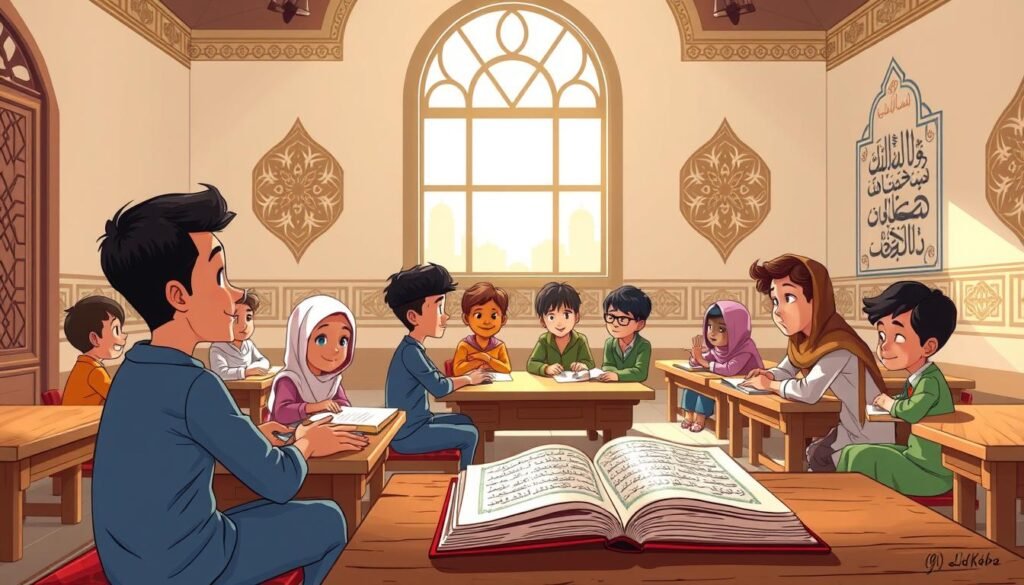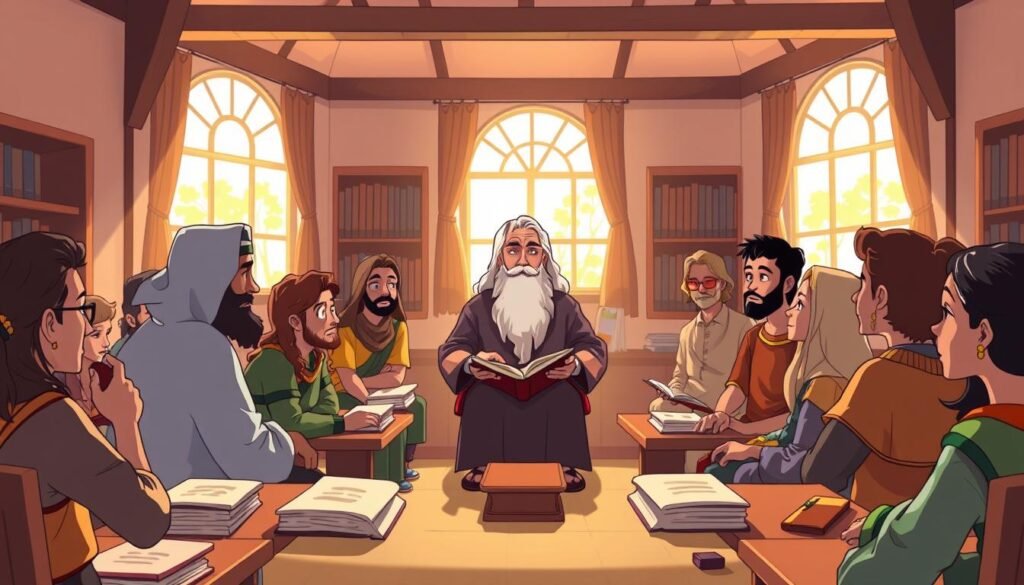Thinking about education in Islam makes me think of the Prophet Muhammad’s (peace be upon him) words. He stressed the need to seek knowledge, a key part of Islamic education. His teachings show how vital it is to learn and grow.
The Prophet said, “Seeking knowledge is an obligation upon every Muslim.” These words really hit home and motivate us to learn more. They encourage us to seek knowledge and understanding.
In Islam, seeking knowledge is not just a duty but also a way to grow spiritually. The Quran says we should pray for more knowledge. This shows how important learning is in Islamic teachings.
Learning is seen as a way to connect with Allah’s creation. The Prophet taught that thinking deeply about creation is more valuable than praying for a year. This shows the value of using our minds and learning.
Looking into the Islamic view on education, we see its importance. The Prophet taught that every Muslim must seek knowledge. This shows how education is key in the community.
By embracing this view, we can understand education’s role in Islam. It shapes our lives and communities. The Hadith about education reminds us of the value of learning. I hope my thoughts inspire others to start their own learning journey.
Understanding the Islamic Perspective on Knowledge Seeking
Exploring the Islamic view on seeking knowledge shows that education in Islam is key. The Quran and Hadith stress the importance of knowledge in Islam. They urge Muslims to keep learning all their lives.
The Islamic tradition sees great value in knowledge and education. It knows they help grow individuals and society. The Quran talks about ‘al-‘ilm’ (knowledge) in 27 verses, showing it’s essential for every Muslim.
In Islam, every Muslim must seek knowledge. The term ‘alim (knowledgeable) is used 140 times in the Quran. This shows how vital knowledge is and how it should be a lifelong goal.
The Divine Command to Seek Knowledge
The Quran and Hadith guide us on the value of seeking knowledge. The Prophet Muhammad ﷺ taught us to act with good intentions. Muslims should aim to please Allah and help others through learning.
The First Revelation and Its Educational Significance
The first message to the Prophet Muhammad ﷺ was to “read” (Iqra’). This shows how important education and knowledge are in Islam. It shows how learning impacts personal and societal growth.
The Relationship Between Faith and Learning
In Islam, faith and learning go hand in hand. Muslims are encouraged to learn and grow spiritually. This balance is key for becoming a well-rounded, knowledgeable person.
Foundational Hadith About Education and Their Meanings
Exploring Prophetic teachings on learning shows that education is key in Islam. The Prophet Muhammad (PBUH) said, “Seeking knowledge is obligatory upon every Muslim.” This shows how vital Muslim education is for personal growth and society.
The Quran starts with “Read” (Surah Al-Alaq, 96:1), stressing the need for literacy and knowledge. The Prophet’s teachings also support this, saying to seek knowledge from birth to death. This shows education is a lifelong journey.
Education in Islam is more than just learning facts. It’s also about spiritual growth. The Quran asks, “Is he who knows the best?” (Surah Al-Zumar, 39:9), showing the value of knowledge. This teaches us that education makes us and our society better, encouraging us to focus on Prophetic teachings on learning and Muslim education.
The Prophet Muhammad’s Personal Approach to Teaching
The Prophet Muhammad’s teaching was filled with compassion and empathy. He made sure students felt safe to ask questions and explore. This is shown in many Hadith about education, highlighting the value of seeking knowledge.
He was patient, kind, and flexible with his students. He used stories, analogies, and questions to explain complex ideas. This made learning fun and built a sense of community among his students.

Looking at the Prophet’s teaching, we learn about the power of compassion and adaptability in education. We should think about the Islamic view on education and the Prophet’s wisdom. This helps us understand the true value of knowledge and the joy of seeking it.
The Rewards of Seeking Knowledge in Islam
Exploring Education in Islam shows its deep impact on one’s spiritual and material life. The Quran and Hadith stress the rewards for those who seek Education in Islam with true dedication. This pursuit is seen as a key virtue in Islam.
The Prophet Muhammad (s.a.w.) said, “Seeking knowledge is a duty upon every Muslim.” This shows how vital importance of knowledge in Islam is for Muslims. It aids in spiritual growth and development. The Quran also values knowledge, saying Allah (SWT) will elevate believers and the knowledgeable.
Seeking knowledge teaches us to be humble and respect our elders. The Prophet Muhammad (s.a.w.) compared the knowledgeable person to the moon’s brightness. This highlights the value and duty of seeking Education in Islam and the importance of knowledge in Islam.
Women’s Education in Prophetic Teachings
Exploring Muslim education, we see that Prophetic teachings value knowledge for both men and women. The Quran says seeking knowledge is a duty for everyone. The Prophet Muhammad (pbuh) also said that “Seeking knowledge is mandatory for every Muslim,” for both genders.
Women play a key role in Islamic education. Scholars like Aishah Binte Abu Bakr and Khadijah Binte Khuwaylid have greatly contributed. Aishah, the Prophet’s wife, shared over 2,000 Hadith, showing women’s big role in teaching Islam. Khadijah, a leader, proved women can hold important positions with education.
Empowering Women through Education
Prophetic teachings highlight education’s role in unity and growth. Islamic law sees educating girls as a sacred right. Studies show it lowers fertility and mortality rates and boosts women’s work participation.
Also, educated women help communities recover faster from conflicts. They build resilience and unity.
In summary, education is key for both men and women, as Prophetic teachings show. It promotes unity, growth, and empowerment. Recognizing women’s education’s value is vital for a balanced Islamic view on today’s issues.
Practical Applications of Educational Hadith in Modern Times
Exploring the Islamic view on education shows us how Hadith about education are key. They help us understand knowledge and learning. Today, these Hadith guide us in using technology in schools and teaching critical thinking and morals.
A study found that technology in education can make learning better. It saves time and money and makes learning more fun. This matches the Islamic view on education, which values knowledge and thinking skills. For more on Islamic views, check out Islamic culture and education.

Contemporary Educational Challenges
Even with technology’s benefits, there are challenges. False Hadith and wrong ideas can harm Islamic teachings. To tackle these, we need to follow Prophetic education principles, focusing on morals and knowledge.
Implementing Prophetic Educational Principles Today
By using Prophetic education, we can make learning better. It should mix knowledge with action and teach critical thinking and morals. Remember, Hadith about education and the Islamic view on education are vital. Let’s work to understand and apply these principles in today’s world.
The Role of Teachers According to Prophetic Traditions
Teachers are key in Islam for sharing knowledge and guiding students. The Prophet Muhammad (pbuh&hp) is seen as a teacher for everyone, as the Quran says (Surah al-Jumuah, 62:2). This shows how important knowledge is in Islam. Islamic teachings value knowledge highly and respect those who teach it.
At Muslim Culture Hub, we see how education is valued in Islam. The Prophet taught with kindness and welcomed all students. Imam Sadiq (p) said it’s important to be humble when learning from others, showing teachers’ high status in Islam.
Teachers in Islam do more than just teach. They help students grow in character and spirit. Al-Ghazali said teachers help people get closer to Allah, showing their spiritual duty. Teachers should be trustworthy, honest, compassionate, and patient to create a supportive learning space.
The best of people is the one from whom others benefit, reflecting the importance of teachers in Islamic traditions.
In summary, teachers have a big role in Islam, filled with responsibility and importance. By valuing knowledge and teachers, we can build a more caring and inclusive learning environment. This environment will reflect the values of Islamic education.
Character Development Through Education
Reflecting on Prophetic teachings on learning, I see how key character development is in Muslim education. Education shapes the minds and hearts of future generations. It teaches them values and principles for life.
Moral Education in Hadith
Moral education is key in Hadith, showing us how to live right. Studying the Prophet’s teachings helps us understand moral education’s role. We learn the value of compassion, empathy, and kindness in our lives.
Balancing Knowledge and Action
In Prophetic teachings on learning, we learn to balance knowledge and action. Just knowing things isn’t enough; we must act on it. This balance helps us develop strong character, guided by our values.
Through character development, we become more compassionate and responsible. Embracing Muslim education principles helps us build a better future for all.
Embracing the Prophetic Vision of Lifelong Learning
Reflecting on Prophet Muhammad ﷺ’s teachings, we see the Islamic view on education is about never-ending growth. The Quran’s first word, “Iqra” or “Read,” highlights the importance of seeking knowledge. This shows how deeply knowledge is valued in Islam.
In the Golden Age of Islam, places like Baghdad and Cordoba became hubs of learning. Leaders like Caliph al-Hakam II and Caliph Harun al-Rashid promoted education. Their efforts show how learning can change lives and communities for the better.
FAQ
What is the importance of education in Islam according to the Prophet’s teachings?
What is the Islamic perspective on knowledge seeking and its significance?
What are some foundational Hadith about education and their meanings?
How did the Prophet Muhammad approach teaching and learning?
What are the rewards of seeking knowledge in Islam?
What is the Islamic perspective on women’s education?
How can the educational Hadith be applied in modern times?
What is the role of teachers according to Prophetic traditions?
How does Islamic education focus on character development?
What is the Prophetic vision of lifelong learning?

Embracing Faith, One Insight at a Time!
The teachings of the Quran have always guided my path. With a deep passion for Islamic knowledge, I strive to blend the wisdom of tradition with the relevance of today, making the timeless messages of Islam accessible and meaningful for everyone.
Muslim Culture Hub is my platform to share historical insights and thought-provoking articles, exploring both well-known and lesser-discussed aspects of Islamic culture and beliefs. My mission is to create an inclusive online space where everyone can learn, strengthen their faith, and connect with the profound message of Islam.
Join the journey!
May peace be upon you.








